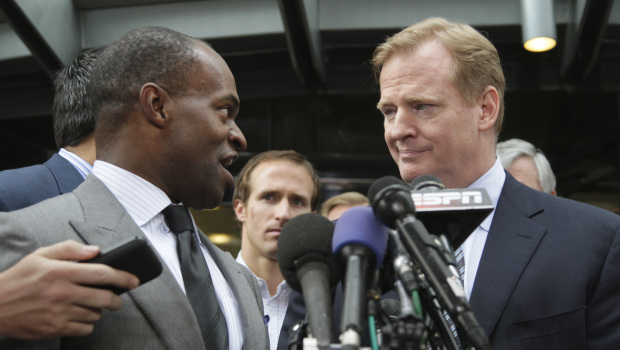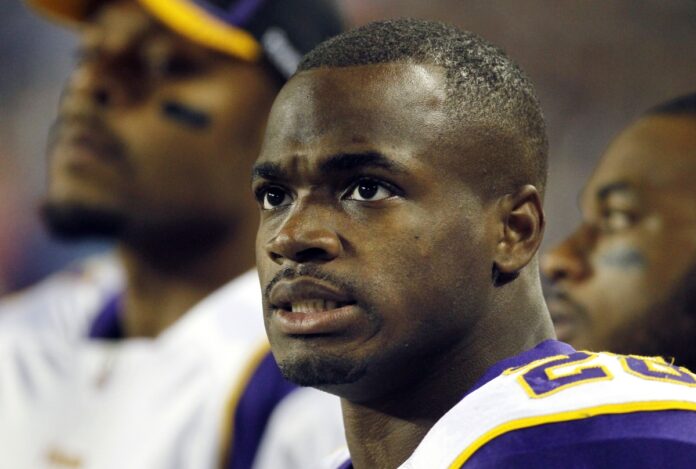…They Just Don’t Use It
Adrian Peterson unleashed a Twitter tirade yesterday. It’s hard to prioritize meeting his wants and needs when he’s the one who pleaded out of a felony child abuse charge, causing him to miss a season, and then tried to force his team to trade him.
While his social media outburst is unlikely to alter his circumstances, it’s essential to acknowledge that some of Peterson’s frustrations are shared by many players, even if he’s not the best spokesperson at the moment.
At the core of Peterson’s argument, aside from his evident desire to leave the Vikings, is the issue of non-guaranteed contracts in the NFL—a significant concern for players.
I, like numerous current and former players, empathize with this frustration.
While I won’t go into the entire series of tweets (which can be found here: https://twitter.com/AdrianPeterson), a couple of his posts touch on the notion of a power imbalance—an idea that could benefit from some refinement.
A lill crazy how one side has so much power that they can do as they please when it come to the contract! But when the other-side (player's)
— Adrian Peterson (@AdrianPeterson) May 28, 2015
Feels for whatever reason! Family, Change of scenery or simply – what they feels just might work best for them! Those same laws don't apply!
— Adrian Peterson (@AdrianPeterson) May 28, 2015
The perception of a power imbalance in the NFL, tilting in favor of teams and owners, is undeniable. However, the actual existence of such an imbalance is not as clear-cut.
Wait, what?
Indeed, teams presently wield significant influence over players.
They have the authority to release them from contracts at will rather than honoring them until their designated end date (as Peterson alludes to in his other tweets).
Additionally, the league’s disciplinary process often appears biased and inconsistent—contrary to its public image.
This situation arises because players haven’t, and didn’t, leverage their power to address these questionable aspects of our league.
If you keep what power you have holstered, you can’t rightfully complain about the outcome of any fight. Use it or lose it.
The paramount power in any negotiation between the league and players lies in the fact that the players have the option not to participate.
It’s worth reiterating: they have the choice not to play. The presence of star players on the field is the primary revenue driver in the NFL money-making apparatus.
For instance, QB Tom Brady brings considerably more value to attendance and TV ratings than QB Bob Grady would… just as DE JJ Watt holds more sway than DE RJ Spot, and so forth.
If the star players opted out, broadcasters and advertisers would express their discontent, there would be turmoil in Vegas, and among fantasy football leagues, merchandise sales would plummet, and the league would soon find itself in a state of panic.
Any terms under discussion would decidedly shift in favor of the players. No doubt about it. Until that point, any gains in negotiations will, at best, be modest.

This might sound like a cynical perspective on the NFL, but it’s actually a realistic outlook on negotiations in various spheres of life.
If you don’t utilize the power you possess, it’s not fair to complain about the resulting outcome. It’s a case of “use it or lose it.”
I can’t speak to the specific details of what options were available to the union leadership in the final stages of the 2011 negotiation.
However, if the players’ ultimate leverage (refusing to play) wasn’t on the table, then it doesn’t seem logical to lament the final result.
The FBF Podcast offers some intriguing insights from individuals involved in those particular negotiations, which can be found at the 22:45 mark here.
If Adrian Peterson was prepared to sit out (before he made his mark), then that would have been a different story.
If he had persuaded players like himself across the league to do the same to alter the terms of our agreement back in 2011 fundamentally, he wouldn’t be expressing these same grievances now.
Since we, as players, didn’t take that collective action, it’s essentially like shouting into an empty corridor.
If, by chance, the players had wanted to keep the option of not playing on the table, and NFLPA head DeMaurice Smith removed it, then that’s a different matter.
However, I don’t have information to confirm that, so I don’t see any reason to criticize Smith for not obtaining something he likely didn’t have the authority to secure.
Ultimately, most of the focus during the 2011 lockout revolved around safety and getting players back to work rather than significantly improving the terms of our relationship with the league.
These objectives simply aren’t synonymous. To effect change in the deal, you had to be willing not to work.
Trying to avoid a loss of work led to the terms we currently have. Blaming individuals today doesn’t seem to serve much purpose.

When you voice grievances about the terms of your current agreement, it’s essential to consider the actions that led to their current state.
The 2011 lockout spanned the offseason and concluded on July 21, 2011.
The only on-field casualty for the league was the preseason Pro Football Hall of Fame Game.
Essentially, the league suffered a minor setback. If the lockout had concluded on September 1, the terms would unquestionably be different.
If it had been October 1, they might have been even more advantageous for players.
However, it didn’t happen that way. That’s just the way the cookie crumbled.
The question is, how far were you indeed prepared to go? Simply jabbing in a fight won’t yield the desired outcome.
In a league that consistently demonstrates a reluctance to implement significant change unless absolutely compelled, either through legal action (as seen in the concussion settlement) or under intense public (and advertiser) scrutiny (as exemplified by the Ray Rice video incident), it’s crucial to understand the challenges at hand and negotiate accordingly.
Peterson’s complaint essentially boils down to the fact that, as players, we didn’t secure what we didn’t actively fight for.
So, if you want it, fight for it the next time around. A significant portion of the league’s disciplinary process can potentially be addressed through legal action, as demonstrated by Tom Brady’s ongoing battle with the NFL, or rather, the league of arbiters.
However, when it comes to contract rights, players will have to roll up their sleeves and dig in.
There may be some initial discomfort, but it’s a necessary step towards achieving long-term benefits. That’s the only path forward.
If players don’t take this step, the vision of “guaranteed contracts” and a more equitable relationship with the league simply won’t come to fruition.

